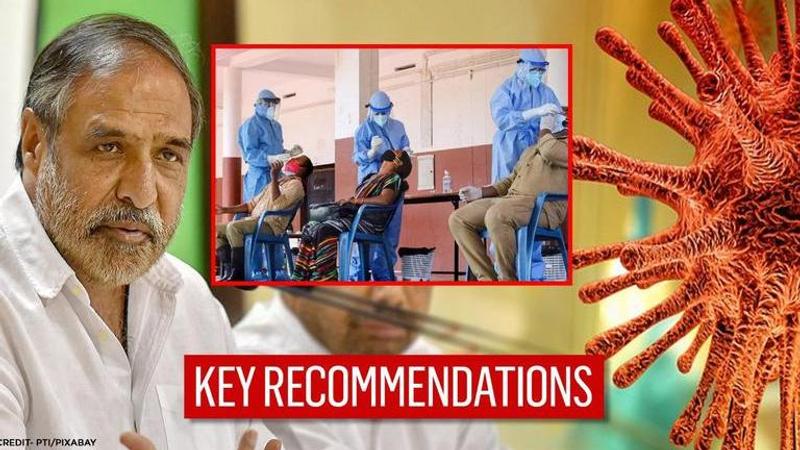Published 21:00 IST, December 21st 2020
India's COVID-19 management examined by Parliamentary panel; Here are key recommendations
On Monday, the Anand Sharma-led Parliamentary Standing Committee on Home Affairs presented a report on 'Management of COVID-19 pandemic and related issues'.

On Monday, the Anand Sharma-led Parliamentary Standing Committee on Home Affairs presented a report on 'Management of COVID-19 pandemic and related issues'. The 31-member committee had 10 members from the Rajya Sabha and 21 from the Lok Sabha. While appreciating the efforts of the Centre for controlling the spread of the novel coronavirus, it pointed out that there was no testing facility at airports throughout March 2020 when international passengers were the only source of novel coronavirus infections in India. Moreover, the panel highlighted that the sudden imposition of the lockdown led to unprecedented disruption leading to severe economic and social fallouts.
Contending that migrant workers, factory workers and daily wage earners were the worst affected, it held the lack of timely dissemination of information responsible for the movement of migrant workers to their home states. The committee also weighed in on other aspects such as the health infrastructure, social and economic impact of the pandemic and the lessons for the future. Currently, there are 1,00,55,560 novel coronavirus cases in India out of which 96,06,111 patients have recovered and 1,45,810 fatalities have been reported.
The committee's report can be accessed here.
Here are the key recommendations of the committee:
- The government should draw up a national plan and guidelines under NDMA, 2005 and Epidemic Diseases Act, 1897. An effective functional institutional mechanism is needed for co-ordination between the Centre, states and Union Territories for quick response to such a crisis in the future. This would ensure efficacious implementation of all decisions to contain pandemics and equitable/timely distribution of relief at district and subdivisional levels to the intended beneficiaries in urban and rural areas.
- The public sector healthcare delivery system needs to be further strengthened in all the states/ UTs and a uniform healthcare system should be established across the country to deal with the pandemic on a sustained basis in future. The committee recommended that in the long term, there should be more investments in health infrastructure for the rapid scaling up of public health services.
- There is a need to identify the states where the testing facilities need to be expanded as the testing facility is not the same across the states and Union Territories. Even within states also, districts should be identified and adequate health infrastructure should be made available there.
- Relevant data should be made available for the research community duly following data anonymization, security and privacy laws which can provide required input for COVID-19 management and access, analyze and provide realtime context-specific solutions to control the COVID-19 pandemic.
- There is a need for a comprehensive public health Act, preferably at the national level with suitable legal provisions to support the government in keeping checks and controls over the private hospitals as there have been reports about the selling of hospital beds by them. The Act should also keep a check on the black marketing of medicines and product standardization.
- While undertaking vaccine trials, all necessary and mandatory requirements must be duly fulfilled and all phases must be completed. Trials on small animals, human trials should be mandatorily undertaken on a sufficient sample size population. If at all emergency authorization would be given, it should be given by the government with proper consideration and caution and this provision should be used in the rarest of the rare cases.
- A separate wing may be formed in the National Disaster Management Authority that will specialize in handling /managing the Pandemics like COVID-19 in the future. This wing may take a leading role in building a partnership of Government with the public sector, corporates, NGOs and other stakeholders.
- The government should ensure a decent minimum wage, food security and safe living conditions to all the workers employed in both the formal and informal sector by including them in health services, cash transfer and other social programmes. The National Database on migrant workers should be launched at the earliest as it will help in the identification of migrant workers and also in delivering ration and other benefits to them.
- A scheme may be worked out to provide financial assistance as well as low-cost subsidized devices like tablets, smartphones and computers to students with sufficient data to access these facilities, especially for the students belonging to weaker sections of the society.
- More interventions and schemes are required by the government to support the recovery and to sustain this economic revival in the following quarters.
- The Epidemic Diseases Act, 1897 should be revisited, updated and amended so that it is fully equipped to respond to the challenges posed by the unanticipated onset of the Pandemic/ epidemic in the future.
Updated 21:00 IST, December 21st 2020




